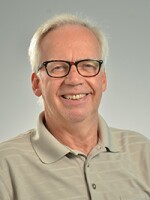At a time when the Kansas City police department and its chief, Rick Smith, have been scrutinized for their handling of the Black Lives Matter protests in the Plaza area, the Police Athletic League (PAL) has renewed its efforts to bridge the gap between the department and the community.
The PAL Center, located at 18th and White in northeast Kansas City, reopened July 13. Kansas City police officer Sgt. Douglas “Skip” Cox, who understands the negative perception of police these days, supervises PAL and believes it’s important to reach out to Kansas City kids.
“They can humanize us back to their parents and they help bridge that gap,” said Sgt. Cox.
The PAL Center closed in mid-March because of the coronavirus pandemic, and the closing left a void for nearby residents who expressed their feelings through poster signs taped to the doors of the PAL entrance with messages such as, “Before PAL, I was sad. After PAL, I was happy.”

Deyanira Gudino, 22, is one of those residents.
She made her first trip to the PAL Center at the age of 10. She recalls the feeling she had as a child before going to the PAL Center to take up boxing.
“I was afraid of officers,” Gudino says. “I’ve told people this: I used to think they were bad. I used to think they were evil.”
Gudino remembers some disturbing instances of crime in the area when she was younger and attending the since-razed McCoy Elementary school three blocks north of the PAL Center. It was before she turned to the PAL Center as a safe haven.
“There were times when we were put on lockdown and we had no clue what was going on. Or there were times where we were (on) reading time and everything was so quiet,” she says. “Then you would hear gunshots in the background, so it was really good to know that there was a place we could go to.”
Gudino’s younger sister, Lincoln Prep senior-to-be Carmen, 17, played softball at the PAL Center. She continued to play at the Kansas City Urban Youth Academy and became one of the honored youths to travel to the 2018 World Series at Dodgers Stadium in Los Angeles. Now, she plays softball for Lincoln Prep.
After the recent PAL reopening, Carmen Gudino learned that she won first-place in a PAL essay contest that was started before the shutdown in March.

But since March, there were disturbing moments between the KCPD and the Black Lives Matter protesters after the nation’s outcry as a result of the death of George Floyd captured in Minneapolis Minnesota, video on a cellphone.
Those moments also resonated with Deyanira Gudino, who saw the Floyd video and is aware of the deaths of other Blacks around the country like Breonna Taylor in Louisville and Freddie Gray in Baltimore. But it hit her especially hard when she saw the television coverage of the Black Lives Matter protests in Kansas City.
“I am angry and upset for what has happened,” Gudino says. “But it was really scary, especially because I know so many officers personally.”
Because of the PAL Center shutdown, Sgt. Cox was also on the front line during the Kansas City protests, the first time he had been in the field, in his estimate, in 15 years.
It was certainly ripe for a chance meeting between Sgt. Cox who had seen many of the kids who went to PAL grow into adulthood.
He didn’t run into any of them but was struck by a memorable encounter.
“I did have a gentleman who was actually one of the organizers for Black Lives Matter, who stopped in front of me and pointed at me,” Sgt. Cox recalls. “He said, ‘I know you.’”

Sgt. Cox says he felt uncomfortable at that moment until the protester filled him in on when they met at a convenience store parking lot a few months earlier. Sgt. Cox drove his police vehicle with a PAL logo on it into the store parking lot.
“We talked about PAL and I was like, ‘Whew!’ I was relieved, and I was like, ‘Yeah, I do remember that.’ He was like, ‘You’re one of the good ones.’”
PAL also made a lasting impression on Deyanira and Carmen Gudino and hope the benefits of PAL overshadow the officers around the country who’ve acted deplorably in tragic instances that have resulted in the death of Blacks.
“So many officers that I know would be against what happened with other officers who shouldn’t have been officers,” says Deyanira Gudino.
And, it’s those officers who inspire her to become one of them someday.


